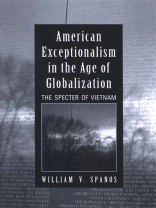Connects the American exceptionalist ethos to the violence in Vietnam and the Middle East.
In American Exceptionalism in the Age of Globalization, William V. Spanos explores three writers-Graham Greene, Philip Caputo, and Tim O’Brien-whose work devastatingly critiques the U.S. intervention in Vietnam and exposes the brutality of the Vietnam War. Utilizing poststructuralist theory, particularly that of Heidegger, Althusser, Foucault, and Said, Spanos argues that the Vietnam War disclosed the dark underside of the American exceptionalist ethos and, in so doing, speaks directly to America’s war on terror in the aftermath of 9/11. To support this argument, Spanos undertakes close readings of Greene’s The Quiet American, Caputo’s A Rumor of War, and O’Brien’s Going After Cacciato, all of which bear witness to the self-destruction of American exceptionalism. Spanos retrieves the spectral witness that has been suppressed since the war, but that now, in the wake of the quagmire in Iraq, has returned to haunt America’s post-9/11 ‘project for the new American century.’
Зміст
Preface
Acknowledgments
1. History and Its Specter: Rethinking Thinking in the Post-Cold War Age
2. Althusser’s ‘Problematic’: Vision and the Vietnam War
3. Who Killed Alden Pyle?: The Oversight of Oversight in Graham Greene’s The Quiet American
4. Retrieving the Thisness of the Vietnam War: A Symptomatic Reading of Philip Caputo’s A Rumor of War
5. ‘The Land Is Your Enemy’: Tim O’Brien’s Going After Cacciato
6. American Exceptionalism, the Jeremiad, and the Frontier, Before and After 9/11: From the Puritans to the Neo-Con Men
7. Conclusion: The Vietnam War, 9/11, and Its Aftermath
Notes
Index
Про автора
William V. Spanos is Distinguished Professor Emeritus of English and Comparative Literature at Binghamton University, State University of New York. He is the author of many books, including American Exceptionalism in the Age of Globalization: The Specter of Vietnam and Herman Melville and the American Calling: The Fiction after Moby-Dick, 1851–1857, both also published by SUNY Press.












